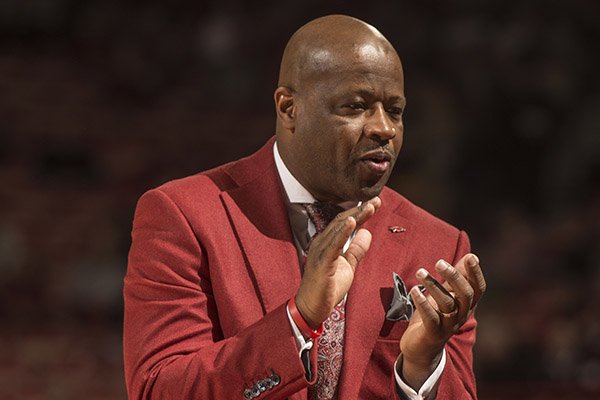Mike Anderson’s optimism for next season’s Arkansas basketball team lies in the talented junior college class it has signed for next year.
Those players combined with a solid nucleus of returners, including seniors-to-be Dusty Hannahs and Moses Kingsley, make Anderson think that this time next year the Hogs will still be alive in the NCAA Tournament.
He mentioned that and his hope for next year during a news conference this week. The concentration on junior college transfers shows the need to bring in players who can contribute immediately.
That hasn’t worked out well for Anderson in his first five seasons.
While Anderson and his staff have developed players, it has taken time. Other than a select few underclassmen such as Bobby Portis and Michael Qualls (and even he didn’t become really dominant until his junior season) has there been young players who have made a major impact immediately.
The standard has been more like the slow development with players like Anthlon Bell, a senior this past season, and Kingsley. They played and contributed, but it took a few seasons to blossom.
Anderson, and most other DI coaches, don’t have the luxury of waiting three or four years. Programs need freshmen and sophomores to make immediate impacts.
In most cases, such as with Portis, the good underclassmen are gone after a season or two. That has coaches of big-time programs expecting young players to produce as soon as they step on campus.
It is no coincidence that powers such as Duke, Kansas and Arkansas’ SEC nemesis, Kentucky, have young players. They recruit and sign the best prep players, those players help their respective programs win big, and then they leave for the NBA.
Anderson’s problem has been landing those kinds of players.
The Hogs swung and missed on Archie Goodwin, who played one season at UK before leaving for the NBA, and Bentonville senior Malik Monk. They have had to settle for lesser prep players or highly regarded players, such as Trey Thompson and Anton Beard, haven’t shown dominance … yet.
When you have to wait to cultivate talent for three or four years, other programs pass you by. That’s what has happened to the Hogs in the SEC.
So, for a quick fix, Anderson has turned to three highly regarded junior college players – the most he has signed in one class – and depending on what happens next year, that may be the best strategy to land talented players who can contribute the first season on campus.
It’s not like Arkansas can’t land talented prep players. Jimmy Witt, Thompson, Beard and others were ranked highly and coveted by other major programs.
However, it is worth mentioning that the 2016 class is Anderson’s highest ranked class nationally - No. 25 by one service - and, on paper, is the greatest collection of talent. The hope is that will lead to a bigger immediate impact than other classes.
Anderson landed the best. Guards Jaylen Barford, Daryl Macon and post player Arlando Cook are top 10 national junior college recruits.
Arkansas most likely can’t land three top-10 prep players, so why waste your time. Play to your strengths, and apparently the UA staff has figured out a way to land top JUCO players.
The risk, and why some coaches shy away from JUCOs, is not all adjust immediately and some come with baggage. It is a big risk/reward proposition, but one some programs are forced into, some every year and others occasionally.
Arkansas has never, even during the glory days of Nolan Richardson in the mid-1990s, nabbed classes chock full of blue-chip preps. He always referred to his players at Burger King All-Americans, alluding to McDonald’s, whose All-American game features the best high school players nationally.
Even so, Richardson’s players developed and won big until later in the decade.
Anderson has turned to a JUCO-heavy class out of urgency to make sure next year is a special season that produces a deep tournament run and keeps his seat from warming.
However, if it works, it may be a strategy that the Hogs use more and more to stock pile its roster with the talent it needs to compete for an SEC championship every season.

